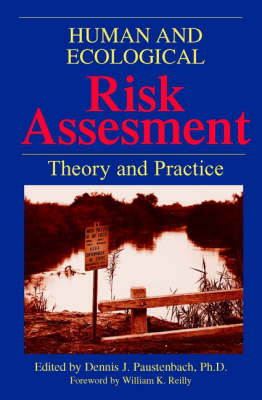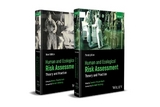
Human and Ecological Risk Assessment
John Wiley & Sons Inc (Verlag)
9780471147473 (ISBN)
- Titel erscheint in neuer Auflage
- Artikel merken
"Human and Ecological Risk Assessment: Theory and Practice" assembles the expertise of more than fifty authorities from fifteen different fields, forming a comprehensive reference and textbook on risk assessment. Containing two dozen case studies of environmental or human health risk assessments, the text not only presents the theoretical underpinnings of the discipline, but also serves as a complete handbook and "how-to" guide for individuals conducting or interpreting risk assessments. In addition, more than 4,000 published papers and books in the field are cited. Editor Dennis Paustenbach has assembled chapters that present the most current methods for conducting hazard identification, dose-response and exposure assessment, and risk characterization components for risk assessments of any chemical hazard to humans or wildlife (fish, birds, and terrestrials). The topics addressed include hazards posed by: air emissions; radiological hazards; contaminated soil and foods; agricultural hazards; occupational hazards; consumer products and water; hazardous waste sites; and, contaminated air and water.
The bringing together of so many of the world's authorities on these topics, plus the comprehensive nature of the text, promises to make "Human and Ecological Risk Assessment" the text against which others will be measured in the coming years.
DENNIS J. PAUSTENBACH, PhD, has held numerous leadership positions at two major consulting firms and was the founder of ChemRisk, the largest risk assessment consulting firm in the United States during the 1990s. He previously edited the popular The Risk Assessment of Human and Environmental Health Hazards: A Textbook of Case Studies and has worked on many high profile environmental projects, including Times Beach, Love Canal, the New Jersey Meadowlands, and the Erin Brockovich case.
FOREWORD (William Reilly). FOREWORD TO THE FIRST EDITION (William Ruckelshaus). PREFACE (Dennis Paustenbach). CONTRIBUTORS. ABOUT THE AUTHOR. SECTION A. THEORY:HUMAN HEALTH ASSESSMENT. 1. Primer on Human and Environmental Risk Assessment (Dennis Paustenbach). 2. Hazard Identification (Dennis Paustenbach). 3. Dose Response Modeling for Cancer Risk Assessment (Suresh Moolgavkar & E.Georg Leubeck). 4. Exposure Assessment (Dennis Paustenbach). 5. Risk Characterization (Pamela Williams & Dennis Paustenbach).SECTION B. THEORY:ECOLOGICAL RISK ASSESSMENT. 6. Ecological Risk Assessment:History and Fundamentals (Anne Sergeant). SECTION C. CASE STUDIES INVOLVING CONTAMINATED WATER. 7. Assessing the Risks Posed by Chromium in Groundwater:A Case Study Involving 300 Residents (Brent Kerger Brent Finley Dennis Paustenbach). 8. Estimating the Value of Research:Illustrative Calculation for Ingested Inorganic Arsenic (Warner North Frank Selker Tom Guardino). SECTION D. CASE STUDY INVOLVING CONTAMINATED SOILS. 9. Risk Assessment of Chromium Contaminated Soils: Twelve Years of Research to Characterize the Health Hazards (Deborah Proctor Mark Harris David Rabbe). SECTION E. CHARACTERIZING EXPOSURE TO AIR CONTAMINANTS. 10. Quantification of Variability and Uncertainty: Case Study of Power Plant Hazardous Air Pollutant Emissions (H.Christopher Frey Ranjit Bharvirkar).11. Characteristic Time,Characteristic Travel Distance,and Population Based Potential Dose in a Multimedia Environment: A Case Study (Deborah Bennett T.E.McKone W.E.Kastenberg). SECTION F. EVALUATING OCCUPATIONAL HAZARDS. 12. Methods for Setting Occupational Exposure Limits (Hon Wing Leung). 13. Worker Hazard Posed by Reentry Into Pesticide Treated Foliage: Reassessment of Reentry Levels/Intervals Using Foliar Residue Transfer A-Percutaneous Absorption PBPK/PD Models, with Emphasis on Isofenphos and Parathion (Jim Knaak C.C.Dary G.T.Patterson J.N.Blancato). SECTION G. CASE STUDY INVOLVING EXPOSURE TO RADIONUCLIDES. 14. Dose Reconstructions for Radionuclides and Chemical: Case Study Involving Federal Facilities at Oak Ridge,Tennessee (Tom Widner Susan M.Flack). SECTION H. EVALUATING RISK TO FOODS. 15. Transport of Persistent Organic Pollutants to Animal Products: Fundamental Principles and Application to Health Risk Assessment (George F. Fries).16. Estimating Dietary Exposure:Methods,Algorithms,and General Considerations (Barbara Petersen). 17.Analysis of Possible Health Risks to Recreational Fishers Due to Ingesting DDT and PCBs in Fish from Palos Verdes Shelf and Cabrillo Pier (Natalie Wilson Valerie Craven Paul S.Price Dennis Paustenbach). SECTION I. ASSESSING RISKS ASSOCIATED WITH CONSUME PRODUCTS. 18. Qualitative Health Risk Assessment of Natural Rubber Latex in Consumer Products (Sean M.Hays Brent L.Finley). SECTION J. CASE STUDIES IN ECOLOGICAL RISK ASSESSMENT. 19. Determining Values:A Critical Step in Assessing Ecological Risk (Douglas P. Reagan). 20. Comparison of Aquatic Ecological Risk Assessments at a Former Zinc Smelter and a Former Wood Preservative Site (Rob Pastorok Walter J.Shields Jane E.Sexton). 21. Integration of Risk Assessment and Natural Resource Damage Assessment: Case Study of Lavaca Bay (Kristy E.Mathews Kirk J.Gribben William H. DesVousges).SECTION K. ASSESSING RISKS TO BIRDS. 22. Using Probabilistic Risk Assessment Methods To Predict E ects of Pesticides on Aquatic Systems and Waterfowl That Use Them (Patrick Sheehan John Warmerdam Shih Shing Feng). 23. Methodology for Assessing Risk to Birds Following Application of Sprayable Pesticide to Citrus:Case Study Involving Chlorpyrifos (Larry Brewer Harry L.McQuillen Monte A.Mayes). 24. Using Ecological Risk Assessment to Evaluate Potential Risks Posed by Chemicals to Birds (Miranda Henning Nadine M.Weinberg Margaret A. Branton). SECTION L. RISK ASSESSMENT AND LIFE CYCLE ANALYSES. 25. Life Cycle Impact Analysis:A Challenge for Risk Analysts (H.Scott Mathews Heather MacLean Lester Lave). SECTION M. RISK COMMUNICATION AND RISK MANAGEMENT. 26. Risk Assessment in Its Social Context (Jessica Glicken Turnley). 27. Trust, Emotion, Sex, Politics,and Science: Surveying the Risk Assessment Battlefield (Paul Slovic). 28. Democratization of Risk Analysis (Gail Charnley E.Donald Elliott).29. Misconceptions About the Causes of Cancer (Lois Swirsky Gold Bruce N.Ames Thomas H. Sloan). SECTION N. EVOLVING ISSUES. 30. Children 's Health and Environmental Exposure to Chemicals: Implications for Risk Assessment and Public Health Policy (Michael Goodman Nancy La Verda). 31. Cost A-Benefit Analysis (Timothy Carrothers John D.Graham). 32. Precaution in a Multirisk World (Jonathan B. Wiener). INDEX.
| Erscheint lt. Verlag | 12.6.2002 |
|---|---|
| Reihe/Serie | Wiley-Interscience |
| Zusatzinfo | Illustrations, 1 port. |
| Verlagsort | New York |
| Sprache | englisch |
| Maße | 165 x 238 mm |
| Gewicht | 2325 g |
| Einbandart | gebunden |
| Themenwelt | Studium ► Querschnittsbereiche ► Prävention / Gesundheitsförderung |
| Naturwissenschaften ► Chemie | |
| Wirtschaft ► Betriebswirtschaft / Management ► Allgemeines / Lexika | |
| ISBN-13 | 9780471147473 / 9780471147473 |
| Zustand | Neuware |
| Informationen gemäß Produktsicherheitsverordnung (GPSR) | |
| Haben Sie eine Frage zum Produkt? |
aus dem Bereich



